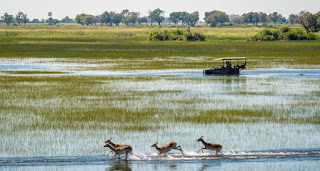The Okavango Delta Problem (Part 3): The Solution?
The Okavango Delta is one of the world's most famous wetlands, officially having been declared a Ramsar site in 1996. Despite its esteemed status, communities residing around the delta have seen their livelihoods deteriorate as a result of the delta's growth.
In this blog series, I will be exploring the reasons for this paradox and what can be done to ensure that communities around the delta benefit from its international acclamation.
While private concession holders and the government are enjoying the billions of pula made from the booming tourism and conservation industry within the delta, communities living adjacent to the delta can only sit back, watch and be told to be grateful for the crumbs thrown to them through initiatives like the CBRM.
Tourism contributes 13.1% to Botswana's GDP while communities who have to deal with their fields and crops being destroyed by elephants and their livestock and people being killed by predators do not even have water and electricity. The truth is that the government controls a majority if not all aspects of the management of the delta so the responsibility falls on them to ensure that the current status quo changes and communities start significantly benefitting from tourism. According to statistics, of the over P1 billion pula coming from the tourism industry within the delta annually, 80% goes to photographic tourism companies, 15.5% to hunting safari companies and a paltry 3.1% goes to adjacent communities through CBRM initiatives. This is wrong and should not be allowed to go on any longer.
Currently, there are no policies that force private operators to include communities in their operations within the delta. Corporate social initiatives should not be limited to these companies donating football kits and food packages once in a blue moon. They should include investments that would help these communities sustain themselves for the long term. In other African tourism destinations like Tanzania, Kenya and Namibia, they have policies in place to enforce community development programs that make tourism companies do right by the communities on which their entire business model is dependent. Why has the Botswana government dragged its feet in doing the same for its own communities?
Involving communities in the tourism industry would actually do good for the industry because they would feel the need and have the inspiration to be proactive in making it a success instead of the current situation where they feel like it's a deterrence to their livelihoods. They would have a motivation to partake in conservation efforts because they would know that they are stakeholders in the industry too and that its success is their success.
Another important factor is ensuring that the growth of the delta's tourism industry is done sustainably and not at the expense of the livelihoods of communities. Economic activities carried out by these communities like fishing, cattle rearing, reed and grass harvesting, etc, should not be forcefully relegated to the back to make room for the tourism industry. Efforts should be made to try to strike a balance between these community economic activities and the growth of the tourism industry.
This can only be achieved through proper consultation coupled with giving communities the power of decision making in all matters regarding the delta. If suggestions of these communities are not implemented on the ground as was the case with the consultation process during the drafting of the Okavango Delta Management Plan, then the whole process would be futile and we will keep circling in the same place with regards to lack of community involvement in the tourism industry.
Over the years, communities have never been at the forefront of policy development processes. Despite so-called consultations, which have proved over and over again to be more theoretical than practical, the central government through various ministries has held decision making power for all aspects of the delta. It has used this power to prostitute the riches of the delta to private foreign interests and high-ranking political figures.
One of the most important founding principles of this country is that all-natural resources within the borders of the country belong to the nation. This principle is what facilitated the use of diamonds to accelerate the development of the country in the 1970s and 1980s. But if that principle means that the natural resources cannot be used to develop communities who live right next door to them and have had to sacrifice their livelihoods to allow the entire nation to benefit, can we really be proud of that? If natural resources line the pockets of private businesses and government coffers while adjacent communities remain destitute, can we really be proud of that?
It is time things change and Batswana start reaping the economic benefits of the beauty of their land not just through government taxes but from being an active part of economic activities and decision-making in the tourism industry. The decades-old status quo of centralized management strategies has for too long undermined communities living next to natural resources. It is time to give Batswana a reason to proudly sing "fatshe leno la rona" knowing that indeed, the land and its benefits is theirs.



Great read
ReplyDeleteThis comment has been removed by a blog administrator.
ReplyDeleteThis comment has been removed by a blog administrator.
ReplyDeleteThis comment has been removed by the author.
ReplyDelete